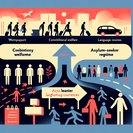
Germany has taken the next step in its multi-year modernisation of immigration procedures by switching on an artificial-intelligence (AI) triage tool in three overseas visa sections—Manila, Bengaluru and São Paulo. The pilot, announced on 21 November by the Federal Foreign Office and the Interior Ministry, comes less than a year after Germany moved all long-stay (D-category) visa applications online.
Under the new model, applicants still complete the standard digital form and upload supporting documents, but the file is next routed through a machine-learning engine that checks data consistency, verifies degree-certificate serial numbers against international databases, and screens employer information against sanctioned-entity lists. ‘Low-risk’ cases—defined as full documentation, recognised university degree, clean security check and company in good standing—are auto-flagged for “fast-clearance”, allowing a consular officer to approve the file in minutes. Complex or ambiguous cases are routed to human adjudicators with an AI-generated risk summary.
![Germany launches AI-powered visa-processing pilot to slash skilled-worker wait times]()
Internal metrics from the first four weeks of testing show dramatic gains: average processing times for ICT transfer permits fell from 54 to 21 days, while EU Blue Card approvals dropped from 42 to 18 days. Error rates, measured by subsequent requests for additional evidence, also declined slightly. Officials stress that final decisions remain with human staff and that the algorithm’s recommendations can be overridden.
For employers, the move is significant. Germany’s new Skilled Immigration Act—phased in during 2024-25—has already widened eligibility for non-EU professionals, but HR teams still face tight on-boarding timelines. Faster consular decisions could help multinationals avoid costly project delays and give Germany an edge in the European talent race, especially against the Netherlands and France, which are only beginning to test automated vetting.
The pilot will run until March 2026, after which Berlin will decide whether to expand AI screening to the remaining 140 visa sections worldwide. Companies are advised to ensure documentation quality because incomplete files will be diverted to the slower manual track. Data-protection safeguards mirror those of Germany’s e-government framework, and applicants must give explicit consent for automated processing when they submit the online form.
Under the new model, applicants still complete the standard digital form and upload supporting documents, but the file is next routed through a machine-learning engine that checks data consistency, verifies degree-certificate serial numbers against international databases, and screens employer information against sanctioned-entity lists. ‘Low-risk’ cases—defined as full documentation, recognised university degree, clean security check and company in good standing—are auto-flagged for “fast-clearance”, allowing a consular officer to approve the file in minutes. Complex or ambiguous cases are routed to human adjudicators with an AI-generated risk summary.

Internal metrics from the first four weeks of testing show dramatic gains: average processing times for ICT transfer permits fell from 54 to 21 days, while EU Blue Card approvals dropped from 42 to 18 days. Error rates, measured by subsequent requests for additional evidence, also declined slightly. Officials stress that final decisions remain with human staff and that the algorithm’s recommendations can be overridden.
For employers, the move is significant. Germany’s new Skilled Immigration Act—phased in during 2024-25—has already widened eligibility for non-EU professionals, but HR teams still face tight on-boarding timelines. Faster consular decisions could help multinationals avoid costly project delays and give Germany an edge in the European talent race, especially against the Netherlands and France, which are only beginning to test automated vetting.
The pilot will run until March 2026, after which Berlin will decide whether to expand AI screening to the remaining 140 visa sections worldwide. Companies are advised to ensure documentation quality because incomplete files will be diverted to the slower manual track. Data-protection safeguards mirror those of Germany’s e-government framework, and applicants must give explicit consent for automated processing when they submit the online form.








